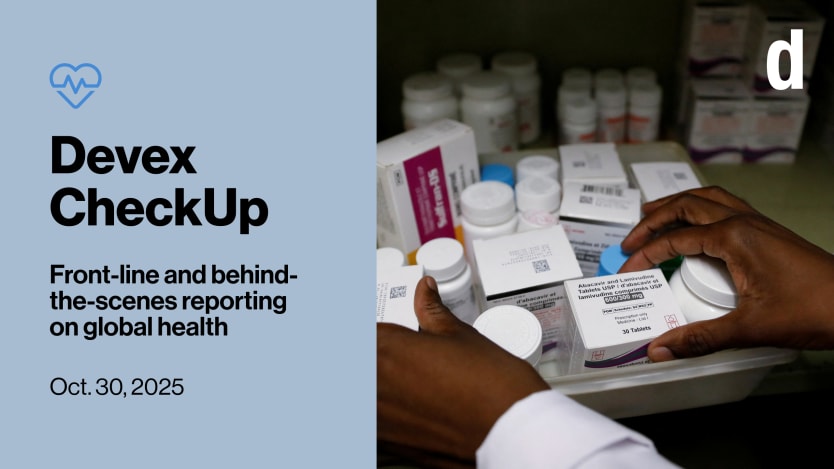Presented by UNICEF

The new “America First Global Health Strategy” is a curious document.
It begins by heaping praise on the President’s Emergency Plan for AIDS Relief — the flagship U.S. global HIV program that has been credited with saving 26 million lives and preventing millions of infections since its launch in 2003.
Then the strategy sets out to completely retool the program it was just celebrating.
Among the key structural changes that the strategy introduces, PEPFAR programs would no longer be run by NGOs. Instead, Washington would channel funding directly to recipient governments, which would be charged with implementing programs.
Future funding would then be tied to benchmarks, both in terms of service delivery and domestic financing.
These components have drawn praise from global health observers, who recognize an opportunity to increase country ownership and to embed HIV services within domestic health services.
Less popular? The strategy is prioritizing commodities and front-line health workers, but wants to wind down support for what it describes as “wrap-around activities,” including technical assistance and quality assurance programs. Except, PEPFAR experts say, these components are exactly what have made the program so successful.
There are other concerns about the strategy, including questions around how it can operate in an emerging PEPFAR data vacuum and worries that this process will be too rushed to allow for an effective transition.
And the impacts extend beyond PEPFAR. The “America First Global Health Strategy” would redefine American involvement across the entire sector, as my colleague Sara Jerving unpacked in a recent Devex Pro Briefing.
Read: How will America’s new global health strategy change PEPFAR?
Watch the briefing: The promise and pitfalls of an ‘America First’ global health strategy (Pro)
ICYMI: Trump’s ‘America First’ global health plan sidelines NGOs
+ Begin your 15-day free trial of Devex Pro and instantly access our comprehensive suite of resources: expert analysis, insider briefings, an extensive funding database, and curated event listings. Discover all the exclusive content available to Pro members here.
Ministers united
Speaking of a pivot to domestic financing, that’s exactly how four health ministers from high-burden tuberculosis countries say their governments must tackle the ancient disease, alongside domestically anchored financing models.
The ministers come from Indonesia, Nigeria, the Philippines, and South Africa, which together account for 25% of the global TB occurrence. In an opinion piece for Devex, they lay out a strategy for funding the solvable problem that is ending TB.
Among the seven tactics they identify are making universal health coverage truly universal, increasing sin taxes on substances such as alcohol and tobacco, and working with donors to swap debt for domestic investments in health systems.
While their emphasis is on domestic commitments, they also call on the leaders of the world’s advanced economies to contribute by linking TB to pandemic preparedness and introducing new innovative financing to address the disease.
Opinion: To end TB, time for us to own our disease response and financing for health
ICYMI: Can countries tax their way out of a global health funding crisis?
Sweltering
Here’s a new fear unlocked: Researchers are worried that some places on Earth are rapidly reaching a point where they will experience a combination of heat and humidity that is so high people will not actually be able to survive.
This is among the profoundly dangerous consequences that a rise in heat is having on our health. Also alarming: Heat-related deaths are on the rise, up by more than 60% in 2012-2021 from the 1990s, according to a new Lancet Countdown on Climate Change and Health report. That translates to 546,000 heat-related deaths annually.
And as heat rises, the dangers it creates expand. Alongside the risk that some parts of the world are becoming virtually uninhabitable, there is also a surge in wildfires and the threat of increased food insecurity as a result of droughts.
Read: Experts warn of a spike in heat deaths as countries backpedal on climate
Getting back online
It’s probably not the first thing that comes to mind when you think of what has been lost with the shuttering of the U.S. Agency for International Development. But the agency funded Demographic and Health Surveys that offered crucial — sometimes singular — insights into domestic violence in countries.
And the information from these DHS surveys helped reshape countries’ responses to that violence, including a 10-year National Gender Policy in Gambia, while providing other crucial health insights.
There is no reason to expect the DHS to be resurrected, at least in its previous form, even as the information it provided remains crucial. That’s why Pooja Joshi, a graduate school student and George Fellow at Harvard, is proposing that regional organizations in the global south take on this work, with the assistance of artificial intelligence and other technologies that might help streamline costs.
Opinion: A USAID-funded demographic survey is in peril. The global south can save it
ICYMI: Critical global surveys fall casualty to US foreign aid gutting
Doomed to repeat
The warning signs of malaria drug failure are already there.
Artemisinin-based combination therapies, or ACTs, are currently the backbone of malaria treatment efforts. But it’s been two decades since the first cases of partial resistance to ACTs were reported in Southeast Asia.
A quick response brought that crisis under control. But now resistance is being reported in East Africa. If ACTs fail, the results could be catastrophic. The last time this happened, when chloroquine failed in the 1990s, malaria deaths spiked to 2 million annually.
In an opinion piece for Devex, Martin Fichet, the CEO of Medicines for Malaria Venture, lays out the steps we can be taking now to avoid ACT failure. At the top of the list are offering multiple first-line treatment options and introducing triple ACTS, both of which will make it harder for the malaria parasite to develop resistance.
Opinion: A crisis in malaria treatment is coming — we must act fast to contain it
What we’re reading
As war and climate change displace people and disrupt health systems, vaccine-preventable diseases, such as diphtheria, are reemerging. [The New York Times]
Bill Gates unexpectedly showed up on an iconic Hindi TV drama to talk maternal and infant health. [BBC]
South Africa became the first African country to approve lenacapavir, the twice-yearly HIV prevention method that policymakers hope will dramatically reduce new infections as it is rolled out worldwide. [Bhekisisa]








